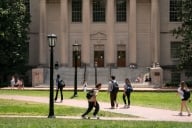You have /5 articles left.
Sign up for a free account or log in.
The amateur era in big-time collegiate athletics, long in decline and increasingly dated, is officially dead. Or at least it will be if a federal judge, as expected, approves a multi-billion-dollar agreement to resolve antitrust lawsuits challenging limitations on compensation for athletes in the country’s most powerful sports leagues.
The National Collegiate Athletic Association’s (NCAA) Board of Governors and the leaders of the five conferences—the Atlantic Coast (ACC), Big Ten, Big 12, Pacific-12 (Pac-12) and Southeastern (SEC)—agreed this week to pay more than $2.7 billion in damages to cover what is essentially “back pay” for use of athletes’ name, image and likeness since 2016. The NCAA will cover more than $1 billion of that total and the five conferences will pay the rest over 10 years, according to news reports.
The settlement, which would avoid a potential courtroom loss for the sports powers that legal experts have estimated at between $4 billion and $20 billion, would also create a revenue-sharing model going forward in which colleges that chose to participate would agree to distribute roughly a fifth of their annual revenue—roughly $20 million each—to their players.
Enormous questions remain to be answered about how the 70-odd universities in the five leagues would come up with enough revenue to cover those costs, given that fewer than two dozen big-time sports programs generate excess revenue now. And the settlement, even if it is approved, does not necessarily eliminate the possibility of future legal action by other athletes, as USA Today reported this week.
But officials of the NCAA and the five leagues characterized the settlement as a potential breakthrough, in a joint statement released late Thursday.
“The five autonomy conferences and the NCAA agreeing to settlement terms is an important step in the continuing reform of college sports that will provide benefits to student-athletes and provide clarity in college athletics across all divisions for years to come,” NCAA President Charlie Baker and the commissioners of the five conference said. “This settlement is also a road map for college sports leaders and Congress to ensure this uniquely American institution can continue to provide unmatched opportunity for millions of students. All of Division I made today's progress possible, and we all have work to do to implement the terms of the agreement as the legal process continues. We look forward to working with our various student-athlete leadership groups to write the next chapter of college sports.”




